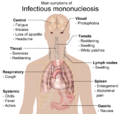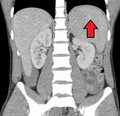Glandular fever facts for kids
Glandular fever, also known as infectious mononucleosis or "the kissing disease," is a common illness caused by a tiny germ called the Epstein–Barr virus. It's often spread through kissing, but you can also catch it from tiny drops of saliva (spit) that float in the air when someone coughs or sneezes.
Contents
What are the Signs of Glandular Fever?
If you have glandular fever, you might notice some of these signs:
- A high temperature or fever
- A very sore throat
- Feeling extremely tired (Fatigue)
- A Headache
- Aches in your muscles
- Small sores inside your mouth
How is Glandular Fever Treated?
There isn't a special medicine to cure the Epstein-Barr virus itself. Doctors often suggest medicines like Paracetamol to help with the fever, sore throat, and muscle pain. These medicines help you feel better while your body fights off the virus. Most people get better in about two to four weeks without any problems.
How Do Doctors Diagnose Glandular Fever?
To find out if you have glandular fever, your doctor will ask about how you're feeling. They will also do a quick check-up. They will look for common signs like swollen glands in your neck, swollen tonsils, or if your liver or spleen feel a bit bigger than usual.
Sometimes, if the physical check-up isn't clear, the doctor might ask for a blood test. There are two main types of blood tests that can help:
- An antibody test – When the Epstein-Barr virus enters your body, your immune system makes special fighters called antibodies. This test looks for those antibodies.
- A white blood cell test – A high number of white blood cells in your blood can be a sign that your body is fighting an infection.
Images for kids
See also
 In Spanish: Mononucleosis infecciosa para niños
In Spanish: Mononucleosis infecciosa para niños
 | John T. Biggers |
 | Thomas Blackshear |
 | Mark Bradford |
 | Beverly Buchanan |





